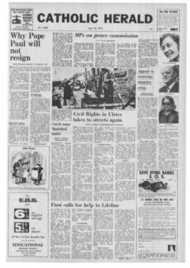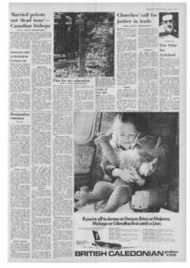Page 4, 28th April 1972
Page 4

Report an error
Noticed an error on this page?If you've noticed an error in this article please click here to report it.
Tags
Share
Related articles
'englishman's Worship'
The Redeemer Of Man
New Life In A Free Church Can Mean New Revolution
Diversity Of English Catholics
Even Holland Has Moderates And Latin Mass
A Church independent of societies
by Fr. MICHAEL RICHARDS
I AM examining, each fort night, the way in which the Church operates in history, looking not simply at the various lessons which history teaches, but at the nature and character of the Church itself. What sort of organisation do we belong to? How can we understand it so as to make the most of our lives as members of it?
One fact about the Church which takes a lot of learning is its radical independence from the various societies in which Christian principles have been embodied and expressed in one way or another throughout history.
The Church is not the Middle Ages, or Byzantium, or the Ancien Regime, or the middle years of Queen Victoria's reign, when religion flourished so mightily in England. The Church is not even the way we were brought up as children.
The reason why the Church does have an effect on human society is precisely its separateness from that society :
its non-historical source. By taking part in the life of the Church, we are brought into touch with an eternal, changeless, ever-young, everliving spring of life which stamps an ageless quality on our thoughts and acts, here and now, and gives them permanent significance and lasting value.
Unless that fact about the Church is borne in mind we shall continually get the Church wrong and get history wrong. Everyone wants to make history and to make themselves by doing something different, to some extent breaking away from the previous generation and taking a fresh line.
Mistake
And when people identify the Church with ancient history in general and with the
previous generation i n particular, they write it off as necessarily not their own thing.
Bertrand Russell, for example, wrote a book called "Why I am not a Christian," which should really have been entitled "Why I am not a Victorian Conservative Evangelical Fundamentalist."
You would have thought that someone with his ability would have seen the mistake he was making. Or perhaps not; for faith is not tied to intellectual gifts and, after all, a great many Christians make exactly the same mistake.
One of the ways in which Catholic scholars make it is to confuse the Church with Christendom. I have just been reading the fifth volume of Werner Stark's "The Sociology of Religion."
The work is sub-titled "A Study of Christendom," and the preface to this volume tells us that Christendom came to an end at the French Revolution. after which time a process of de-Christianisation began.
Now it is perfectly possible to study European society before the French Revolution and even, from certain points of view, to call it "Christendom"; but what one must not do is take another step and identify what one is looking at with the Church.
And that, unfortunately, is what a lot of people are doing, with consequent discomfort for their contemporary state of mind.
"When I see a peasant on a donkey, then I know that I am in a Catholic country." There you have this mistake again, made this time by a leading prelate who likes Mediterranean (and Hibernian?) holidays.
Survival
As soon as you identify the Church with one particular bit of history or with one particular bit of geography, you are lost. What you are looking at may well be nothing more than feudal custom or pagan survival or ancient folk observance dressed up in Christian clothes.
The decline of the custom, the overturn of the economic pattern which perpetuates a social style, and Christianity and the Church apparently disappear as well.
Christian faith makes Christ available at any time in history. The family of 1-tic Church, made up of those who hear and obey His Word, exists as a community in a great variety of human circumstances— in peace and prosperity, in war and destruction, in monasteries and convents, in prisons and concentration camps, in cellars confining kidnapped hostages, in space rockets, in St. Peter's Square, in universities and in Arctic wastes.
Because this fact is forgotten, and Christianity is identified with one or other social pattern, people think that deChristianisation is setting in as soon as the pattern itself changes: this is the line taken by a certain number of historians and theologians, feeding the minds of modern prophets of doom with decidedly pessimistic thoughts.
Happily other historians are coming along to give us a more balanced picture of things. Talk of post-Reformation or post-Revolutionary "de-Christianisation" is discovered to be
assuredly alarmist when one finds out that France was never more Christian than it was for a time in the seventeenth century, or England than in the nineteenth century.
Future
'iteople look at certain ways in which the Church is changing today, and interpret it all in terms of decline, because they think that the Church should go on for ever reproducing some idealised image of itself which they derive from their reading or from their own past experience.
They should look instead at their own present and future and the fresh calls God is making upon them, and they should look as well at the new life always to be found springing up in the ruins of the old.
The missionary opportunity open to the Church in England is far greater now than it was ten years ago. England's future Catholic history is in the hands of those who are ready to take the chances that are a.t this very moment, being given to them,
blog comments powered by Disqus













